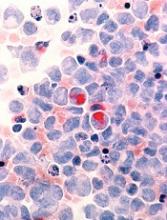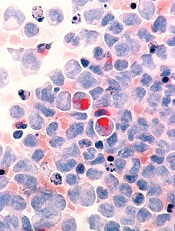User login
The US Food and Drug Administration (FDA) has accepted for priority review a new drug application (NDA) for glasdegib, an oral SMO inhibitor.
With this NDA, Pfizer is seeking approval for glasdegib in combination with low-dose cytarabine (LDAC) as a treatment for adults with previously untreated acute myeloid leukemia (AML).
The FDA grants priority review to applications for products that may provide significant improvements in the treatment, diagnosis, or prevention of serious conditions.
The agency intends to take action on a priority review application within 6 months of receiving it rather than the standard 10 months.
The FDA expects to make a decision on the NDA for glasdegib by December 2018.
The NDA is supported by results from the phase 2 BRIGHT 1003 study. Results from this trial were presented at the 2016 ASH Annual Meeting.
The trial was a comparison of glasdegib plus LDAC (n=88) to LDAC alone (n=44) in patients with previously untreated AML or high-risk myelodysplastic syndromes who were not eligible for intensive chemotherapy.
Results demonstrated a significant improvement in overall survival with glasdegib. The median overall survival was 8.8 months in the glasdegib arm and 4.9 months in the LDAC-alone arm.
This difference represented a 49.9% reduction in the risk of death for patients treated with glasdegib plus LDAC (hazard ratio=0.501; 95% CI: 0.334, 0.752; one-sided P-value=0.0003).
The most frequent adverse events—occurring in at least 30% of patients in the glasdegib arm and LDAC-alone arm, respectively—were anemia (45% vs 42%), febrile neutropenia (36% vs 27%), nausea (36% vs 12%), decreased appetite (32% vs 12%), fatigue (31% vs 20%), and thrombocytopenia (30% vs 27%).
The most frequently reported serious adverse events—occurring in at least 15% of patients in the glasdegib and LDAC-alone arms, respectively—were febrile neutropenia (29% vs 20%) and pneumonia (21% vs 17%).
A phase 3 trial of glasdegib in AML began enrolling earlier this year. In this trial (BRIGHT AML 1019; NCT03416179), researchers are evaluating glasdegib plus intensive or non-intensive chemotherapy in patients with newly diagnosed AML.
The US Food and Drug Administration (FDA) has accepted for priority review a new drug application (NDA) for glasdegib, an oral SMO inhibitor.
With this NDA, Pfizer is seeking approval for glasdegib in combination with low-dose cytarabine (LDAC) as a treatment for adults with previously untreated acute myeloid leukemia (AML).
The FDA grants priority review to applications for products that may provide significant improvements in the treatment, diagnosis, or prevention of serious conditions.
The agency intends to take action on a priority review application within 6 months of receiving it rather than the standard 10 months.
The FDA expects to make a decision on the NDA for glasdegib by December 2018.
The NDA is supported by results from the phase 2 BRIGHT 1003 study. Results from this trial were presented at the 2016 ASH Annual Meeting.
The trial was a comparison of glasdegib plus LDAC (n=88) to LDAC alone (n=44) in patients with previously untreated AML or high-risk myelodysplastic syndromes who were not eligible for intensive chemotherapy.
Results demonstrated a significant improvement in overall survival with glasdegib. The median overall survival was 8.8 months in the glasdegib arm and 4.9 months in the LDAC-alone arm.
This difference represented a 49.9% reduction in the risk of death for patients treated with glasdegib plus LDAC (hazard ratio=0.501; 95% CI: 0.334, 0.752; one-sided P-value=0.0003).
The most frequent adverse events—occurring in at least 30% of patients in the glasdegib arm and LDAC-alone arm, respectively—were anemia (45% vs 42%), febrile neutropenia (36% vs 27%), nausea (36% vs 12%), decreased appetite (32% vs 12%), fatigue (31% vs 20%), and thrombocytopenia (30% vs 27%).
The most frequently reported serious adverse events—occurring in at least 15% of patients in the glasdegib and LDAC-alone arms, respectively—were febrile neutropenia (29% vs 20%) and pneumonia (21% vs 17%).
A phase 3 trial of glasdegib in AML began enrolling earlier this year. In this trial (BRIGHT AML 1019; NCT03416179), researchers are evaluating glasdegib plus intensive or non-intensive chemotherapy in patients with newly diagnosed AML.
The US Food and Drug Administration (FDA) has accepted for priority review a new drug application (NDA) for glasdegib, an oral SMO inhibitor.
With this NDA, Pfizer is seeking approval for glasdegib in combination with low-dose cytarabine (LDAC) as a treatment for adults with previously untreated acute myeloid leukemia (AML).
The FDA grants priority review to applications for products that may provide significant improvements in the treatment, diagnosis, or prevention of serious conditions.
The agency intends to take action on a priority review application within 6 months of receiving it rather than the standard 10 months.
The FDA expects to make a decision on the NDA for glasdegib by December 2018.
The NDA is supported by results from the phase 2 BRIGHT 1003 study. Results from this trial were presented at the 2016 ASH Annual Meeting.
The trial was a comparison of glasdegib plus LDAC (n=88) to LDAC alone (n=44) in patients with previously untreated AML or high-risk myelodysplastic syndromes who were not eligible for intensive chemotherapy.
Results demonstrated a significant improvement in overall survival with glasdegib. The median overall survival was 8.8 months in the glasdegib arm and 4.9 months in the LDAC-alone arm.
This difference represented a 49.9% reduction in the risk of death for patients treated with glasdegib plus LDAC (hazard ratio=0.501; 95% CI: 0.334, 0.752; one-sided P-value=0.0003).
The most frequent adverse events—occurring in at least 30% of patients in the glasdegib arm and LDAC-alone arm, respectively—were anemia (45% vs 42%), febrile neutropenia (36% vs 27%), nausea (36% vs 12%), decreased appetite (32% vs 12%), fatigue (31% vs 20%), and thrombocytopenia (30% vs 27%).
The most frequently reported serious adverse events—occurring in at least 15% of patients in the glasdegib and LDAC-alone arms, respectively—were febrile neutropenia (29% vs 20%) and pneumonia (21% vs 17%).
A phase 3 trial of glasdegib in AML began enrolling earlier this year. In this trial (BRIGHT AML 1019; NCT03416179), researchers are evaluating glasdegib plus intensive or non-intensive chemotherapy in patients with newly diagnosed AML.

